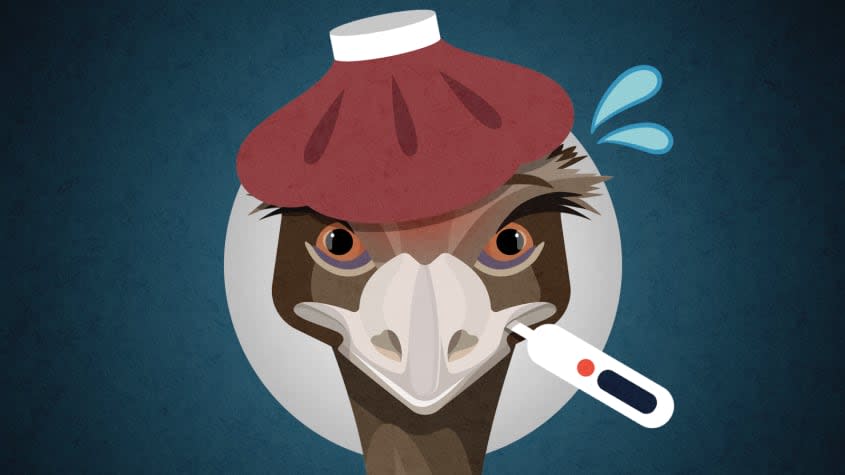The virus making Emmanuel the Emu sick, explained

Emmanuel the Emu is sick with the avian flu.
Who's that? Only the most famous emu on TikTok. He became famous for interrupting videos made by Taylor Blake on the Knuckle Bump Farm in South Florida. (Jimmy Fallon even did a parody.) But Emmanuel is not doing very well these days: Blake announced over the weekend that avian flu has struck the farm with devastating results — killing more than 50 birds, including chickens, ducks, and geese — and sickening the popular emu. "He is a fighter and I wholeheartedly believe he is going to make a full recovery," she wrote on Twitter.
Blake's farm isn't the only victim of the virus. "A near-record number of U.S. chickens and turkeys have died in this year's outbreak of avian flu," Reuters reported on Tuesday. What is avian flu? And should humans worry about the epidemic? Here's everything you need to know:
What's going on with the avian flu?
There was an outbreak early in the year that seemed to subside — though it never entirely fizzled out — and now appears to be surging again. "This year's avian influenza outbreak is the worst the United States has experienced since 2015, the last time the country was hit hard by bird flu," The New York Times reports. Just about any place that keeps a population of domesticated birds, including farms, zoos, and animal rehabilitation centers, "have scrambled to put new precautions in place, moving vulnerable birds inside and suspending public programs."
As the Times suggests, this isn't the first time the virus has gotten loose in the U.S. In 2015, roughly 50 million birds either died from the illness or because they were slaughtered to prevent its spread.
How widespread is the virus?
Very. It has spread to nearly every state, taking a toll on poultry producers — and bringing the number of dead birds to nearly the same levels as 2015. "More than 47 million birds have died due to infections and cullings" Reuters reports. That has lowered egg and turkey production — and, of course, sent the prices of those staples even higher during a period of already-high inflation.
The virus is having impacts all over the nation and the world. Omaha's Henry Doorly Zoo & Aquarium closed some of its exhibits this week after one of its pelicans died from the illness. The zoo is just "one of many across the country that closed down its aviaries and moved birds inside whenever possible," The Associated Press reports. Across the Atlantic, "an avian flu 'prevention zone' has been declared across Great Britain," The Guardian reports. The "strict measures" in the zone include "keeping free-range birds in fenced areas and stringent biosecurity for staff on farms."
Why is it spreading so fast?
No one is entirely sure, but there are theories — including the possibility that the virus has mutated and adapted. "Scientists believe wild migratory birds brought the virus to North America at the beginning of the year and have spread the virus to more than 40 wild bird species," NPR reports. Big weather events have something to do with it. Blake said she'd been told by Florida officials that the epidemic has been exacerbated by the effects of Hurricane Ian, The Washington Post adds. "Various studies have shown that the risk of highly pathogenic avian influenza spreading increases with proximity to contaminated bodies of water."
As usual with these sorts of things, climate change is part of the equation: Drought in California, for example, has reduced the size of the state's wetlands where birds often stop during their migration. That means "wintering flocks may be both unusually crowded and especially mobile" Sarah Trent reports for High County News. This outbreak is spreading mostly among wild birds, though examples like Emmanuel prove it can be transmitted to domesticated populations as well. And that's a problem: "Flocks across the continent are migrating now toward Central and South America, home to the largest diversity of bird species on Earth."
Do humans need to worry about getting sick?
There's probably no need to panic. "Bird flu viruses do not normally infect humans," the CDC says, although there are exceptions if people somehow get the virus in their mouth, eyes, or nose. The Guardian adds that scientists in Great Britain said "the risk to public health from the virus was very low and that properly cooked poultry and eggs were safe to eat."
On the other hand, some experts weren't pleased to see pictures of Blake cuddling with Emmanuel as he tries to recover from the virus. The illness is "spilling over in all kinds of different species, including mammals, which gives me a little pause for humans," one veterinarian told NBC News. "Once an avian virus can move to mammals, now we're in the realm of 'Yeah, we better be careful.'"
You may also like
Special Counsel John Durham's final case goes to the jury after a series of prosecutorial setbacks
Missy Elliott honored in her Virginia hometown of Portsmouth, receives key to the city
Why Russia — losing everywhere else in Ukraine — is still trying to capture Bakhmut

